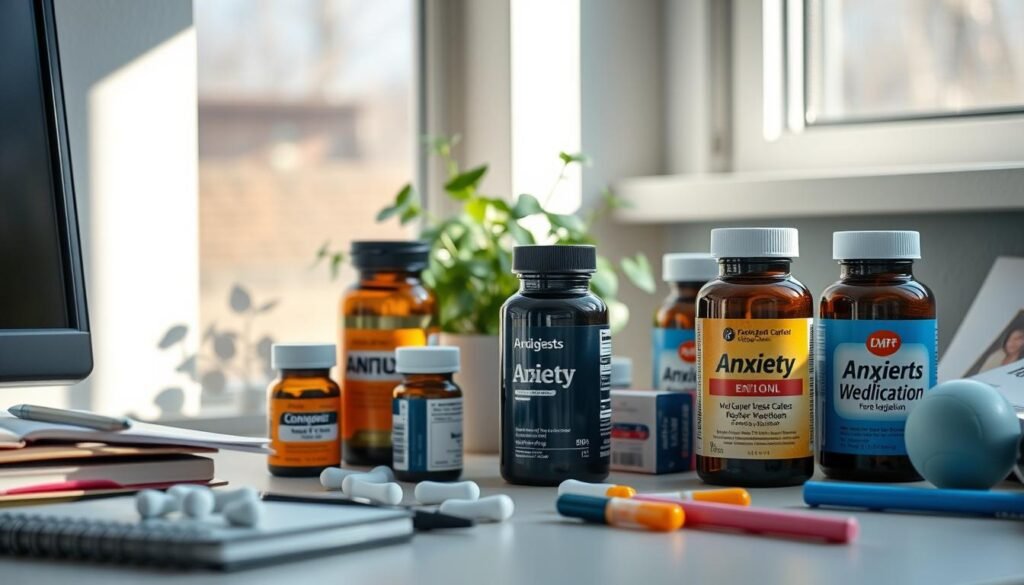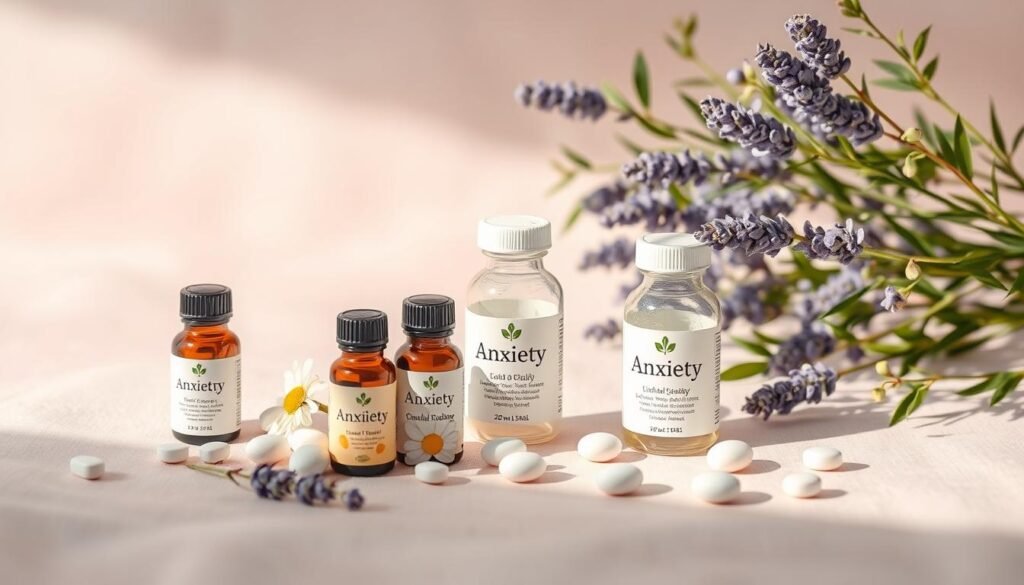Anxiety disorders are the most common mental illnesses in the US. They affect millions. That’s why many seek quick anxiety remedies. Fast acting anxiety meds are key for immediate relief. They help during panic attacks and intense episodes of fear. Thus, they are vital for those facing severe anxiety.
It’s important to know about the different fast acting anxiety meds available. There are both traditional and non-addictive options. Traditional options like benzodiazepines work fast but can be addictive. Safer options, such as buspirone and hydroxyzine, don’t have this risk. To learn more about non-addictive meds, check out this in-depth resource. With the right information and help from professionals, finding effective treatments is easier. This improves overall well-being.
Key Takeaways
- Fast acting anxiety meds provide immediate relief for panic attacks and overwhelming fear.
- Relying on non-addictive medications minimizes the risk of addiction and withdrawal symptoms.
- Benzodiazepines offer quick relief but have a higher risk for dependence.
- Consulting a mental health professional ensures personalized treatment options are available.
- Combining medication with coping strategies enhances overall anxiety management.
- Emergency anxiety treatments can be crucial for severe anxiety episodes.
- Accessibility to quick anxiety remedies can significantly improve quality of life.
The Role of Medication in Anxiety Treatment
Medication is key in managing anxiety, especially when it impacts daily life. Different anti-anxiety medicines, like benzodiazepines and SSRIs, meet various needs. Each type helps in treating anxiety disorders in its own way.
Benzodiazepines offer quick relief but can cause drowsiness and memory problems. They are often used short-term due to risks of dependence. Health experts recommend these until finding a steady treatment. The risk of addiction means careful use is a must. Combining medication with therapy often works best for anxiety.
SSRIs are another main choice for anxiety treatment. Their medication effectiveness for anxiety shows up after 4 to 6 weeks, providing lasting relief. Many find SSRIs better because they have fewer side effects than benzodiazepines.
Choosing the right treatment plan is crucial for beating anxiety. Using psychological therapies with medication helps a lot. Working with health experts, patients can find the best plan for them. For more details, check out this resource.
| Medication Type | Primary Use | Effect On Symptoms | Notes |
|---|---|---|---|
| Benzodiazepines | Short-term anxiety relief | Rapid symptom reduction | Risk of dependence and withdrawal |
| SSRIs | Long-term treatment | Gradual improvement | Lower incidence of severe side effects |
| Tricyclic Antidepressants | Alternative for anxiety | Similar to SSRIs | Higher side effect profile |
| MAOIs | Specific anxiety disorders | Effective but less frequently used | Potentially more side effects |
Understanding Fast Acting Anxiety Med
Fast-acting anxiety meds provide quick relief for acute anxiety. They are crucial in times of intense distress. People often need immediate solutions during panic attacks or severe anxiety episodes. Unlike traditional meds, fast-acting ones work within minutes to hours.
Benzodiazepines are common fast-acting tranquilizers. They help people feel calm about 30 to 60 minutes after taking them. While they’re effective for short-term relief, it’s vital to know their risks. Long-term use can cause dependency, with withdrawal symptoms in up to 40% of users.
Benzodiazepines are useful but come with dangers. Mixing them with opioids can make breathing hard, as both slow down respiration. Misuse is a problem, especially in 17% of teenage users. Young patients should use these meds with extra caution to avoid serious risks.
SSRIs and SNRIs take up to six weeks to work. However, for those in severe distress, fast relief is crucial. While benzodiazepines offer quick help, understanding their benefits and risks is key to using them properly.
| Type of Medication | Onset of Action | Potential Risks |
|---|---|---|
| Benzodiazepines | 30 to 60 minutes | Dependency, withdrawal symptoms, increased risk of misuse |
| SSRIs | Up to 6 weeks | Potential increase in suicidal thoughts, especially in younger patients |
| SNRIs | Up to 6 weeks | Similar risks as SSRIs, possible withdrawal symptoms with discontinuation |
| Tricyclic Antidepressants (TCAs) | Varies, typically longer than SSRIs | Side effects, interactions with other drugs |
Benzodiazepines: The Most Common Fast Acting Anxiety Med
Benzodiazepines are widely used in the U.S. as anti-anxiety medications. They offer fast relief for panic attacks, which boosts their popularity. Medicines like Xanax and Valium are favorites for quickly tackling intense anxiety symptoms.
How Benzodiazepines Work
Benzodiazepines boost the effect of GABA, a brain-calming neurotransmitter. This action lessens anxiety and helps relaxation. People often use them in stressful situations, like speaking publicly or experiencing a shock.
Common Benzodiazepines for Panic Attack Relief
Doctors frequently prescribe several benzodiazepines for anxiety and panic. These include:
| Benzodiazepine | Brand Name(s) | Typical Uses |
|---|---|---|
| Alprazolam | Xanax® | Generalized anxiety disorder, panic disorder |
| Clonazepam | Klonopin® | Panic disorder, seizure disorders |
| Lorazepam | Ativan®, Loreev® | Severe anxiety, insomnia |
| Diazepam | Diastat®, Valium®, Valtoco® | Anxiety, muscle spasms, seizures |
Benzodiazepines are great for quick relief but come with risks. Dependency and withdrawal are big issues with their long-term use. It’s key to talk to a doctor before starting these anti-anxiety meds.
SSRIs and SNRIs: Alternative Options for Anxiety
Selective serotonin reuptake inhibitors (SSRIs) and serotonin-norepinephrine reuptake inhibitors (SNRIs) are key for long-term anxiety help. They work by adjusting brain chemicals. This change boosts levels of vital neurotransmitters and reduces anxiety symptoms over time.

Long-Term vs. Short-Term Treatment
SSRIs are the top choice for treating general anxiety disorder. Lexapro (escitalopram) and Paxil (paroxetine) have FDA approval for this. Prozac (fluoxetine), Zoloft (sertraline), and Celexa (citalopram) also help with anxiety although they’re not specifically approved for it. These medicines usually need about four to six weeks to fully work.
SNRIs, like Cymbalta (duloxetine) and Effexor (venlafaxine), are also helpful. Besides serotonin, they increase norepinephrine. This can help treat certain types of anxiety. SSRIs and SNRIs are better than short-term options like benzodiazepines, which can cause dependency.
To wrap up, SSRIs and SNRIs are good long-term solutions for anxiety. It’s important to talk with healthcare providers to find the best choice for you.
Recognizing the Signs of Anxiety Disorders
Knowing how to spot signs of anxiety disorders can change someone’s life. It’s key to act early to make things better. These signs can start in young years and may continue into being an adult. Identifying anxiety disorders like general anxiety, social anxiety, panic attacks, and phobias is vital.
Common signs of anxiety disorders include:
- Persistent worry impacting daily life
- Panic attacks that might reach their worst in ten minutes
- Quick heart rate and signs like shaking or too much sweating
- Feeling very upset in social places, leading to staying away from them
Tough times, like trauma or constant problems, can really bring about anxiety. People might find their worry affecting their work, friendships, and how happy they feel in life. If anxiety runs in the family, the chances of having it could go up.
It’s also important to know about separation anxiety disorder, which isn’t just for kids. Adults might feel worried about being apart from people they care about. This worry can make daily life hard. Selective mutism is when someone can’t speak in certain places, like school or work. This shows how complex anxiety disorders can be.
Finding joy in activities and keeping up friendships can help. It’s also smart to stay away from alcohol and drugs, as they can make anxiety worse. Spotting the signs early, being active in life, and learning about panic attacks can lead to good treatments and better mental health.
Choosing the Right Fast Acting Anxiety Med for You
Finding the right quick-relief anxiety medication is key for good anxiety management. It’s important to talk to a mental health expert. They can assess your needs and suggest the right approach. Having open talks about your health history and symptoms helps choose the right treatment.
Consulting a Mental Health Professional
A mental health expert can help pick the right anxiety meds for you. They look at your symptoms and situation closely. This way, they make a treatment plan that fits. Their advice ensures you get the best options, considering side effects of anxiety meds and your health.
Factors to Consider: Side Effects and Addiction Risks
When picking anxiety meds, think about possible side effects and addiction risks. Benzodiazepines work fast but may lead to dependence. They can cause memory troubles, lack of coordination, and stomach issues. Understanding these risks helps in making a careful choice.
SSRIs and SNRIs might take 2-4 weeks to work but can offer longer relief. Discuss these options with a mental health professional. This helps find a plan that works well while keeping risks low. For more info on medications, visit this resource.

Emergency Anxiety Treatments and Rapid Calming Supplements
When sudden anxiety hits, emergency treatments can be a lifeline. Rapid calming supplements are a handy, prescription-free option. They’re important to consider, with advice from healthcare professionals.
There are several quick relief options available over the counter. For example, Benadryl starts working in 15 to 30 minutes. It can quickly ease the symptoms of anxiety. An adult dose is usually between 25 and 50 milligrams. Another option, Hydroxyzine, is an antihistamine used for anxiety on a short-term basis.
There are also herbal remedies. You can find them as teas, sprays, or tinctures. They include:
- Valerian root
- Passionflower
- Lavender
But remember, these quick fixes shouldn’t replace long-term treatments. Especially for panic disorders. Combining them with psychotherapy and lifestyle changes is best.
| Supplement Name | Type | Time to Effect | Typical Dosage |
|---|---|---|---|
| Benadryl | Antihistamine | 15-30 minutes | 25-50 mg |
| Hydroxyzine | Antihistamine | 30 minutes | 50-100 mg |
| Valerian Root | Herbal | 30-60 minutes | 400-900 mg |
| Passionflower | Herbal | 30-60 minutes | 250-500 mg |
| Lavender | Herbal | 60 minutes | 80-160 mg |
Non-Addictive Alternatives for Immediate Anxiety Solutions
Exploring non-addictive anxiety medications gives people effective options without addiction risks. These alternatives can help manage anxiety symptoms. They also promote calmness and control.
Buspirone and Hydroxyzine
Buspirone (Buspar) is a second-line medication for anxiety. It slowly improves symptoms by targeting serotonin, without causing drowsiness. Hydroxyzine, an antihistamine, offers quick relief from anxiety symptoms. It’s typically taken as four doses throughout the day, adding up to 50 mg.
Both Buspirone and Hydroxyzine are good choices for those avoiding traditional treatments. They help without the risk of dependency.
Beta-Blockers for Situational Anxiety
Beta-blockers, like propranolol, work well for situational anxiety. They ease physical symptoms, such as a fast heartbeat and shaking. This is especially helpful in nerve-racking situations like public speaking.
Beta-blockers don’t change your mood. This makes them ideal for those needing to stay clear-headed during important moments. They are a key part of managing anxiety more effectively.

At-Home Options for Quick Anxiety Remedies
Addressing anxiety doesn’t always need medication. There are many effective at-home remedies for quick relief. By using relaxation and mindfulness, mental well-being can see a great improvement. These methods let individuals take control of their anxiety.
Meditation and Mindfulness Techniques
Meditation helps foster calmness and awareness. With regular practice, stress melts away and emotional balance is enhanced. Techniques like guided imagery, body scans, and loving-kindness meditation are effective for quick relief. Mindfulness keeps us in the present, reducing feelings of overwhelm.
Breathing Exercises and Grounding Techniques
Breathing exercises play a key role in managing anxiety at home. Techniques like diaphragmatic breathing lower the heart rate, easing anxiety. Grounding techniques focus on physical sensations, offering immediate relief from anxiety. They strengthen the connection between mind and body, bringing calm and security.
Conclusion
Dealing with anxiety can be tough, especially when looking into medication options. Understanding quick relief meds like benzodiazepines is an important first step. These meds help right away but can lead to addiction and have side effects.
There are many other treatments for anxiety, including SSRIs and non-addictive choices. Talking to a healthcare professional is key. They can make a treatment plan that fits you. Yet, even with new meds, many people only get a little better. This shows we must keep looking for better ways to treat anxiety.
In conclusion, managing anxiety well means using several approaches. Medication, therapy like cognitive behavioral therapy, and changes in lifestyle can all play a part. This combination can help improve life quality and offer a path to lasting relief from anxiety.